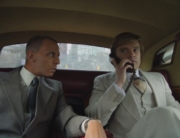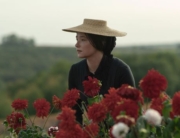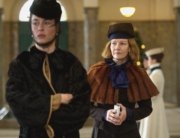There is no way to prepare someone for reading Wuthering Heights. Those who approach it expecting a gentle, swooning romance set against the English moorlands are quickly shocked, and those who know full well that they are in for something that defies their expectations (i.e., me) are still surprised. The novel unsettles and enthralls because it contains an unearthly mix of clashing elements (romance, realism, horror, hints of fantasy, some humor), an astonishing level of savagery, and experiments with point of view and reliability that anticipate modernist writers like Faulkner.
Emily Brontë’s own story comes to us mostly as curated by her older sister Charlotte. Her several prefaces to Wuthering Heights, under the name Currer Bell, famously both celebrates and apologizes for the novel, perhaps anticipating the readers who might be shocked by it. In the biography The Life of Charlotte Brontë by Elizabeth Gaskell, and in these prefaces, Emily comes across as the most withdrawn, headstrong, and least conventional of the her siblings, and not much is known about her for sure. We do know that Emily had a pet hawk, named Hero, who she often brought to the dinner table and that, having been bitten by a rabid dog, she cauterized the raptor’s wound with a burning fire poker. No romantic relationships are known to have occurred, and it is quite possible she died without having known either love or sex.
Neither hawk nor rabid dog finds its way into Frances O’Connor’s biopic Emily, though sex most certainly does. It focuses on the years leading up to the publication of Wuthering Heights and Emily’s (Emma Mackey) death and the defining experiences that lead her to find and claim herself as a writer: her aborted attempts to follow the more conventional life Charlotte (Alexandra Dowling) tried to lead as a schoolteacher; her time wandering the moors, and sometimes getting into trouble, with her brother, Branwell (Fionn Whitehead); and the trauma of seeing his dissolution at the hands of an opium addiction. There is also a second, more successful stint away from home studying with Charlotte in France.
O’Connor, however, chooses to imagine that it was a love affair that shook Emily the most in these years. Enter William Weightman (Oliver Jackson-Cohen), the handsome new curate who ends up tutoring Emily. The meeting of his conventional, duty-bound mind with her wilder nature creates a friction that leads them into an affair. This in turn leads to tension with her brother, who, in his own way, vies for his sister’s affections—the film portrays her as caught between them and needing to define herself against them.
This is a film best seen as a Hallmark–esque, somewhat steamy movie for teens, with a benign but bland message to express oneself no matter what the world thinks. There is some good acting from Mackey, especially in a scene of heartbreak, but largely, though, this film finds itself somewhere between Greta Gerwig’s Little Women and Terence Davies’s A Quiet Passion, bearing plenty of the flaws of both.
Like Little Women, this film fixates on a “you-go-get-’em” paean to creative freedom while largely ignoring the harshness of the world in which the story takes place. When there is any kind of tragedy, it occurs in the most sentimental terms, and I was often astonished by how clean everything looked. Like A Quiet Passion, it does not contain a single convincing depiction of a human being. Charlotte is the condescending, conventional older sister and not much else, and much of the dialogue seems like an accidental parody of Masterpiece. When Emily expresses her individuality, whether by screaming “Freedom in thought” on a hilltop with Branwell or arguing with Weightman about his high-mindedness, it is portrayed in sophomoric, if not simplistic terms. One scene at a séance, however, does provide some spooky fun.
No depiction of an historical figure in a narrative film can fully avoid fiction, and understandably O’Connor had to embrace it when imagining the life of someone about whom so little is known. Nevertheless, there is one invention I found especially odd. The film has Emily, as she dies, urging Charlotte to start writing again. In fact, Wuthering Heights and Jane Eyre were published the same year, 1847. This seems a trite twisting of facts, a concession to the film’s bland “express yourself” message. One wonders what Emily herself would have thought of this scene.







Leave A Comment